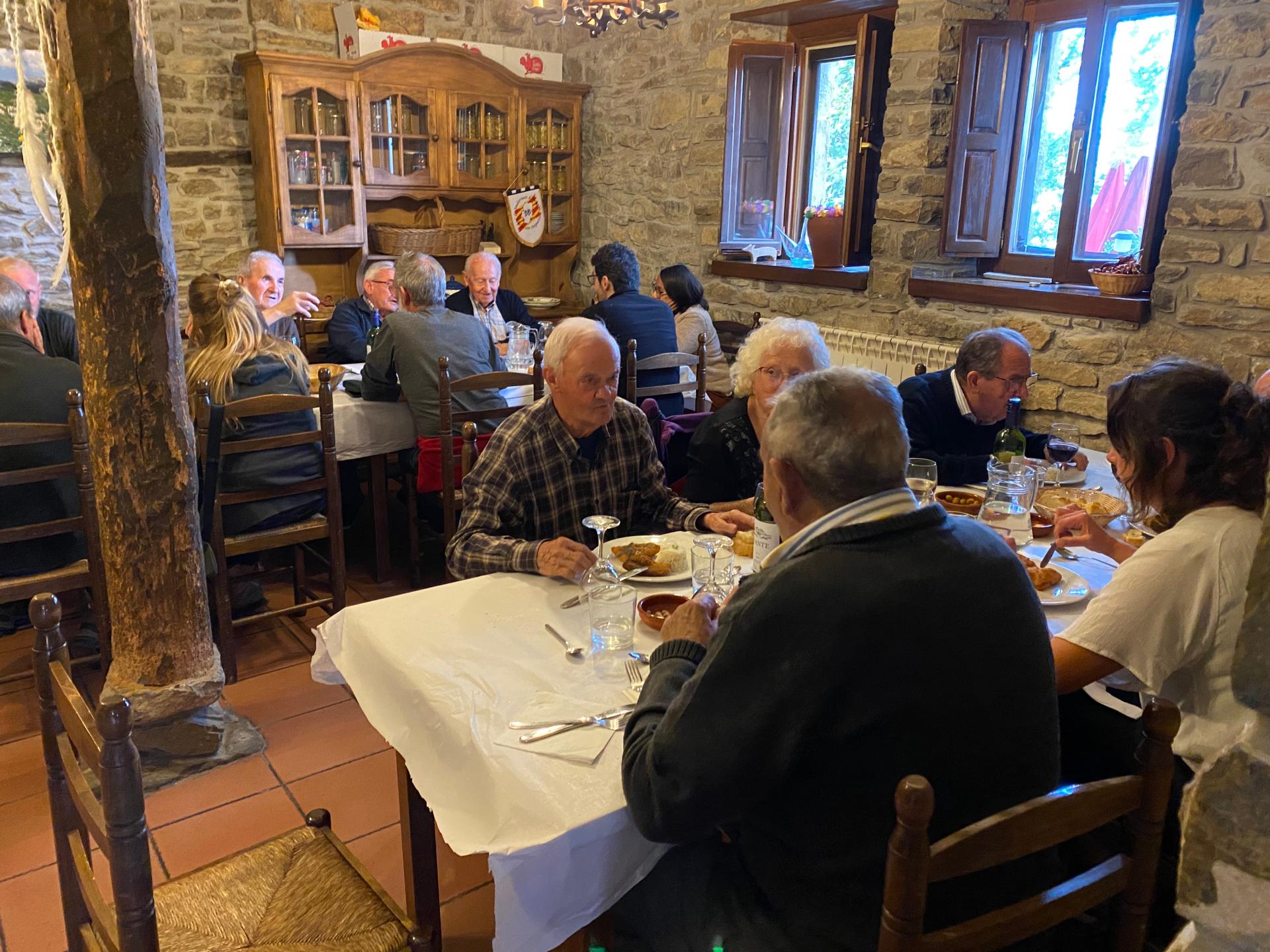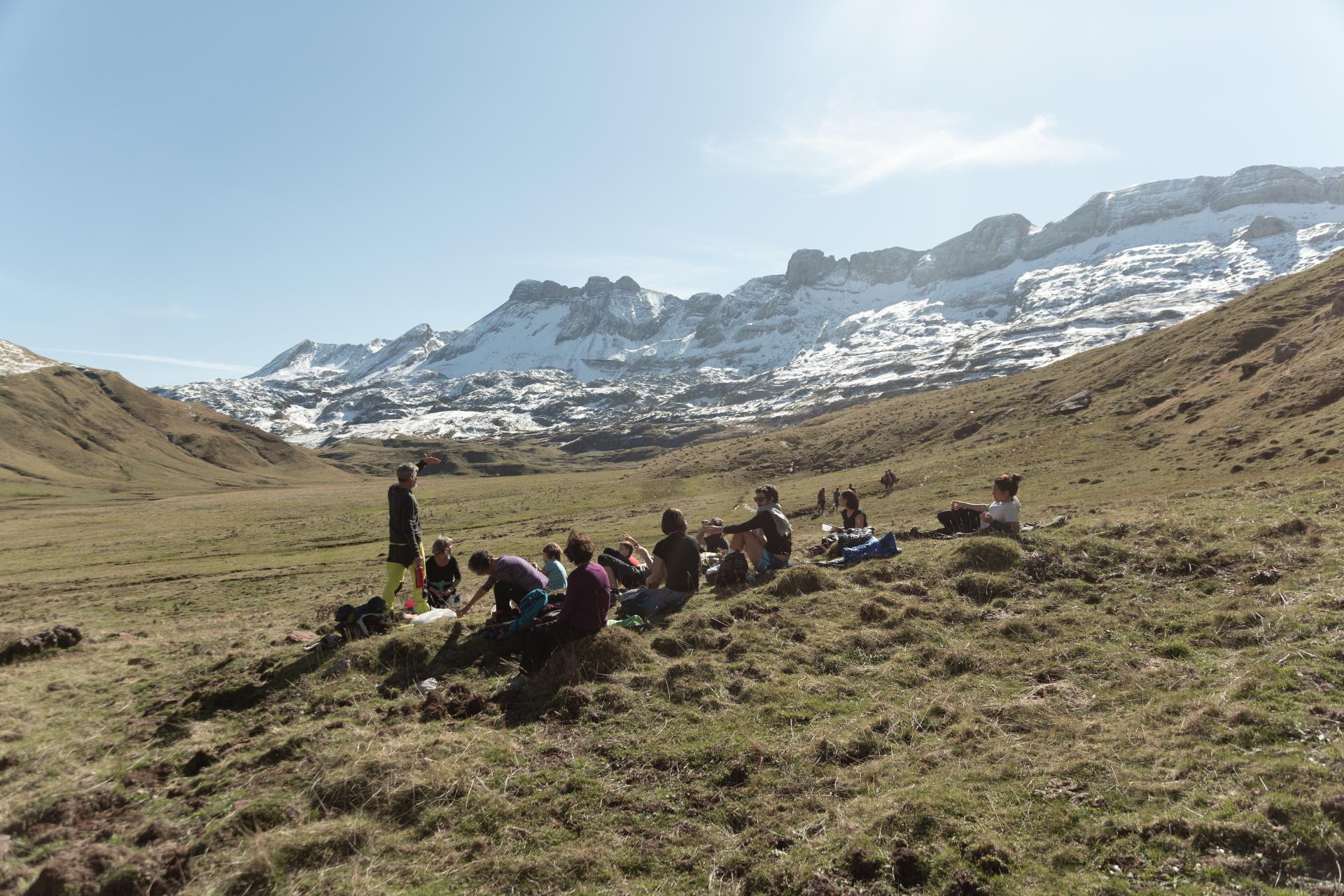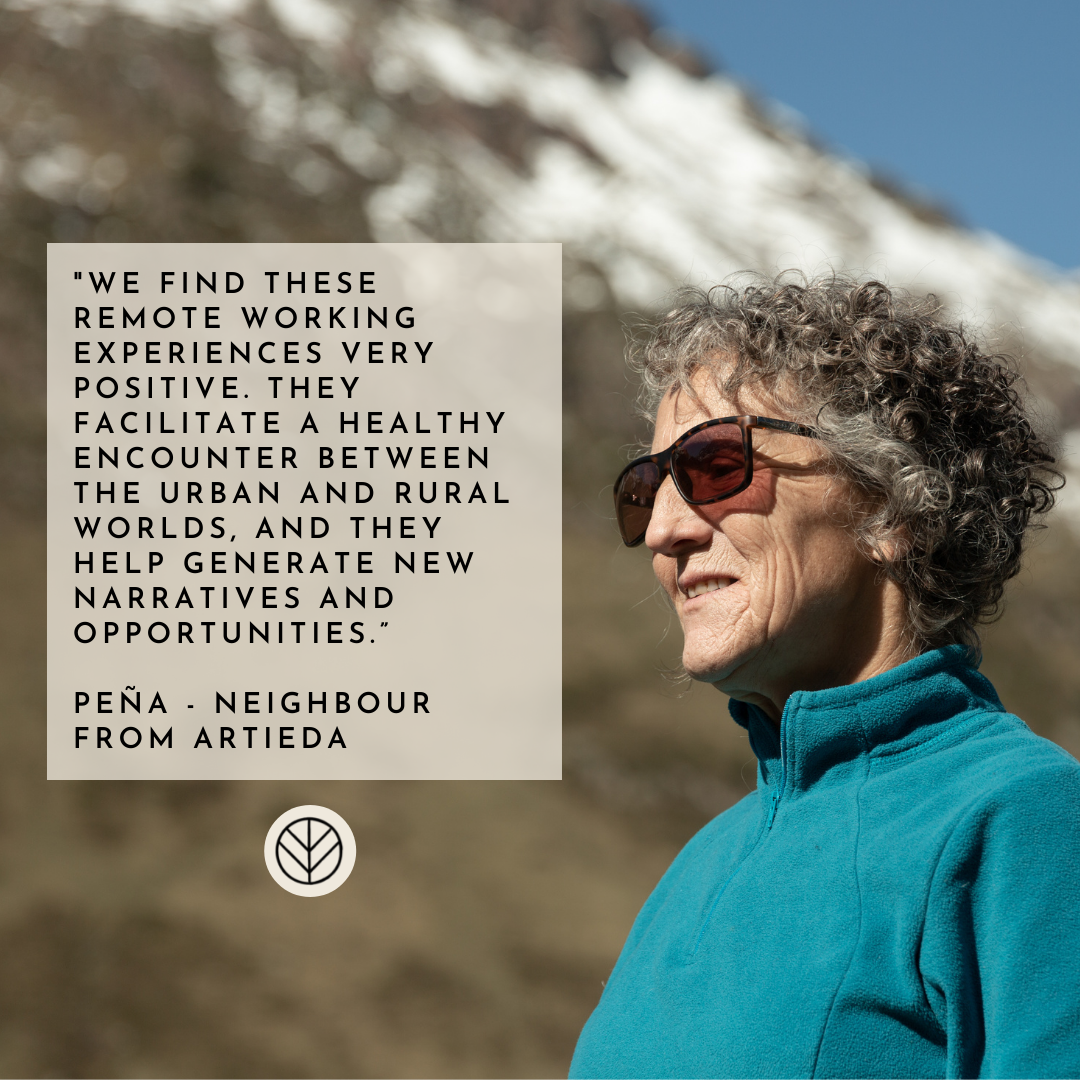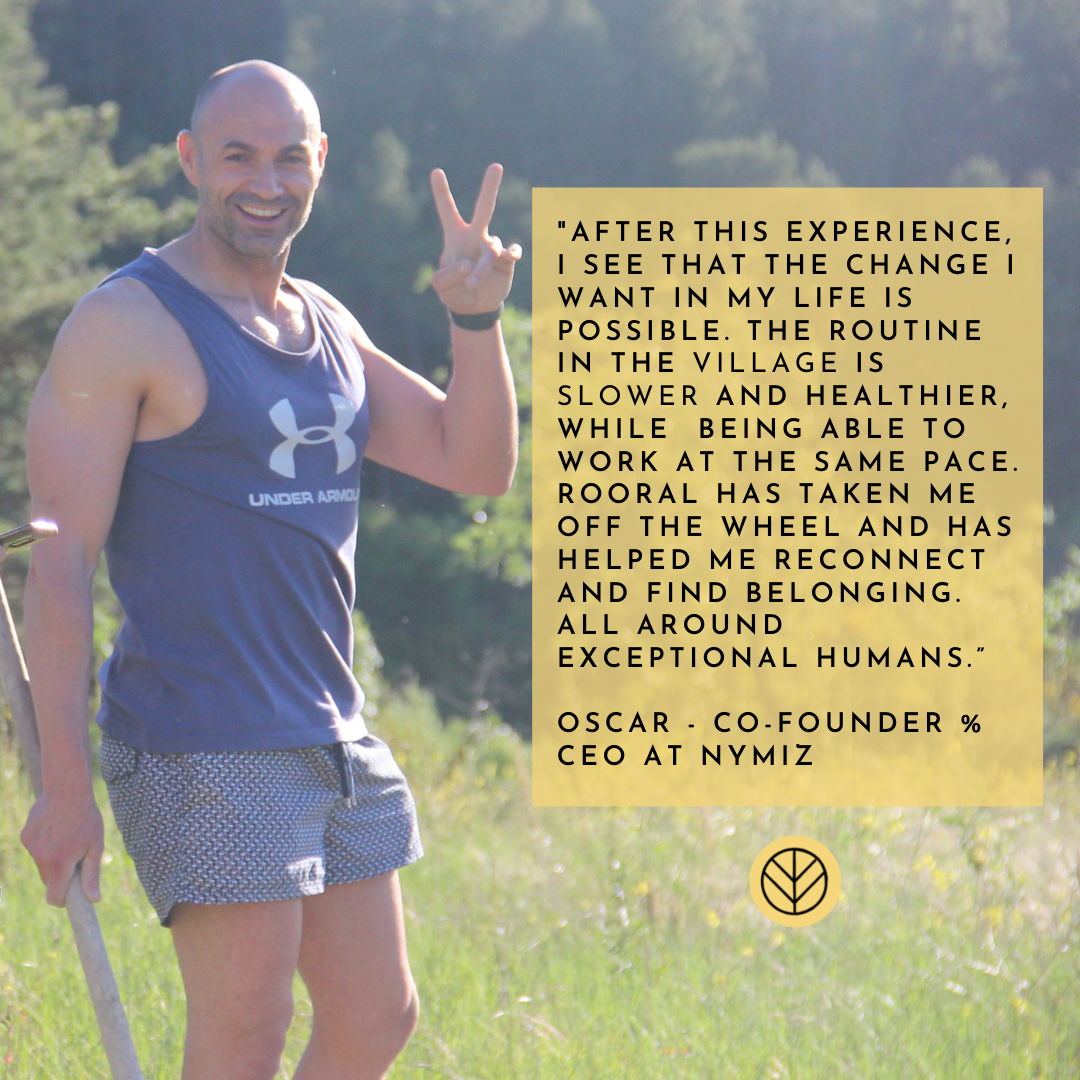Remote work bridging the urban-rural gap
Basic information
Project Title
Full project title
Category
Project Description
For generations we were told that to be successful we had to leave the village. This narrative has made us lose diversity and resilience.
Since COVID, work for many no longer dictates where we are.
So, what if rural areas became grounding destinations where people can work from, restore and support to reactivate?
We partner with small villages to unlock their hosting potential, helping them be the place where urban and rural worlds relate, regain understanding and celebrate diversity.
Geographical Scope
Project Region
Urban or rural issues
Physical or other transformations
EU Programme or fund
Which funds
Description of the project
Summary
The Rural Urban gap is probably the most dividing factor of our century, and Spain is the country in the EU that leads it.
- On one side Spain is the country with the most depopulated land. As villages vanish, so does our culture and ecosystems.
- On the other side it scores the highest urban density levels in the EU, which causes stress and mental health issues.
And since COVID something crucial has changed forever: Work, for many, no longer dictates where we are. Remote Work is here to stay.
So, what if rural areas became remote work destinations where people can work from, reconnect and support to reactivate?
This is Rooral.co
We partner with small villages to unlock their hosting potential. We help them understand the need that urban people have for belonging and connection, and how their rural wisdom and roots can be life-changing for them.
We basically act as translators of both worlds. We help villages understand the interests and expectations of urban people (in terms of comfort, aesthetics, quality...) and we facilitate urban people to connect with the local culture, identity and learnings.
Rooral villages are the place where urban and rural worlds relate, regain understanding and celebrate diversity.
- On one hand, our experiences help participants get their work done while they enjoy a grounded rural setting and its simple and balanced philosophy of life. After the time in the village they feel more connected with themselves, nature and the local community.
- On the other hand, villagers benefit from the economic support especially in low season (rural homes, restaurants, excursions, workshops...) and from the appreciation and connection of their local wisdom and culture by outsiders.
If we want a regenerative future, we need rooted cities and vibrant villages. And to achieve it we need to break the current bubbles we live in and help both worlds to first meet and second relate with curiosity and humility.
Key objectives for sustainability
SDG 3 - Wellbeing:
Mental health problems and burnout rates are skyrocketing. Our remote work stays help participants slow down in community and ground themselves, resulting in an improval of their wellbeing in 92% of the cases. All while they continue with their remote job in a more productive and creative way.
SDG 11 - Sustainable communities:
42% of Spanish municipalities are at severe risk of depopulation (EU source). As rural world vanishes, so does our culture, ecosystems and diversity. By bringing remote work groups the village not only benefits from the economic influx (SDG 8 - economic growth) that balances the seasonality of tourism (accommodation, restaurants, shops...), but also from the foreign expertise and energy.
It has been beautiful to witness collaborations between locals and participants, from co-creations to skills exhanges. The external appreciation of local wisdom and life-style, helps locals value what they have, regain pride and question existing narratives that push them to leave the village behind. We see this with Anayet, youngest kid in a Rooral village, who is realising: “If people from NY and London come to work from my village, perhaps I don´t have to leave to be successful?”.
Villages value this opportunity, mostly because they find it helps them reduce the rural-urban gap, making them feel relevant and valuable again.
SDG 12 - Responsible Consumption:
We believe in the importance of aligning values and money, that is why we get local & organic providers (food, supplies, workforce...). Besides, most activities have the regeneration value in the centre, like permaculture sessions, food safety workshops... 88% of participants say Rooral experiences have helped them consume more responsibly.
The urban-rural gap and its undesired consequences are everywhere. We believe this initiative can be adapted to any local context through participatory processes involving local communities.
Our Theory of Change for more detail
Key objectives for aesthetics and quality
Safe space
Part of the lack of understanding between the urban and rural worlds is that they have different problems and priorities in mind.
If you want both to meet, relate and learn from each other, they must feel comfortable and secure first. This is why at Rooral we put so much emphasis in the design and co-creation of the experience. From making sure undesired situations are detected in advance, to adapting languages or addressing differences through a non-violent communication methodology.
Both sides agree on how much these experiences help them empathize with the difference and learn from it.
Urban & work friendly design:
Villages are functionality heroes in many ways, not always understanding the levels of comfort, aesthetics and quality urban people connect with. This is why we accompany villages to understand what participants are looking for, so that they can adequately prepare spaces, workshops and services, but in a way that aligns with the local culture and identity.
A special note on style, as it is what initially drives people in: if we want people to feel attracted to the rural world and perceive it as a place where they can flourish and thrive, we have to take care of how it is presented, from the moment people meet the initiative to the moment they take part.
Personalization
The previous objective leads to this one, personalization. Every person holds a unique world within and we want to make them feel seen during our stays, both participants and villagers. This is why we try to make the interactions they have memorable. From handwritten welcome notes, to getting involved in the local community initiatives or finding the right activity to support the growth of each participant.
In a point in history where mental health problems are rising, feeling seen, understood and belonging is vital. Our rural world has untapped wisdom to shape our collective wellbeing in the 21st century.
Key objectives for inclusion
Urban and rural worlds have been evolving in different directions apart from each other. It is here where we find the biggest demographic, economic, political, social, spiritual, technological and environmental differences in the EU.
We aim to act as translators of both worlds, trying to emphasise the light and strength each one has and figure out ways to support each other's weaknesses.
In order to do this we work closely with each world, mapping every actor in each system and taking into account their values and priorities into the mix.
Co-Creation & Public Participation
This is a goal and a means to us. We see Rooral as a facilitator of this urban-rural encounter. We build village partnerships, where we understand the vision and goals of the local community, and explore if Rooral remote work experiences align with their values and vision for the village.
We do this with participatory processes where everyone in the village can question the partnership and discuss controversial areas. This is for us the most effective way to develop an experience that empowers local culture and traditions, and builds on local wisdom.
At the same time we make sure the transmission of traditional knowledge, philosophy of life and know-how integrates into urban life-style contexts. We do this by analyzing behavioural and personal patterns in cities, and detecting which areas people are looking to question and revisit. This is how we build a two-ways-bridge of understanding and learning.
Inclusive Ownership
Again, Rooral is just a facilitator, enabling this rural-urban reconnection. The initiative belongs to the people that take part in it: villages, neighbours, participants, partners, etc... That is why Rooral is a social entity, so that the money that is earned is used to support the purpose of reactivating rural areas and grounding urban people.
Rooral, as it is built on participatory approaches, can adapt to any location and context, making it easy to replicate.
Results in relation to category
Villages die because their wisdom and value has been discredited in the past. Cities are stressing citizens with their hectic pace and unreachable success.
Cities need rooting, and rural areas need to regain pride and influence.
We believe both worlds can be the medicine of one another, as long as it is done in a caring and collaborative way. If that happens, as we have witnessed in Rooral, the old narrative of "having to leave your village to become someone" starts to mutate.
We see this with younger rural generations. After seeing ambitious professionals from NY or London come to work from their village and praise them for their warm community and traditions, they start to question if it is necessary to leave to be successful. "Perhaps I don´t need a big city to be prosperous?" says Anayet, the youngest kid in the village.
We also observed the transformation in the elderly, who at the beginning were skeptical about people being interested in working remotely from their village. After several experiences of them sharing with a diverse group of participants and hearing from them what they love about their village, we can feel how old stereotypes and backpacks start to dissolve, leaving room for a regained sense pride and new ambitions for the future of their village. In the words of a local: "Rooral experiences have contributed to the socialisation of our neighbours and are helping deconstruct old rural stigmas."
At the same time, urban people start appreciating a slower life and a deeper relationship with what is important in life: connection to oneself, nature and community. We track their evolution, seeing how these Rooral stays help them reduce their stress (93%), increase their inspiration (92%) and their connection with the rural world (88%).
We see how after the experience, many decide to move for longer periods to rural areas, and those who can’t, decide to bring rural elements into their cities: doing warm composts, urban gardens, walks in nature...
How Citizens benefit
As stated before, part of the lack of understanding between the urban and rural worlds is because they have different problems and priorities in mind. If we want both to meet, relate and learn from each other, they must feel comfortable and secure first.
This is why at Rooral we put so much emphasis in guaranteeing the co-creation of the experience with the rural world.
Whenever we detect a village with potential, we first talk with the townhall to explore if Rooral´s approach is aligned with the medium-long term vision of the village. If there is a positive fit, we then make sure the project is explained to the neighbours and they vote if they are ok with implementing it. This way we make sure that the responsibility is shared with the locals and we open the space for potential ideas and feedback, so that we all row in the same direction.
A key thing moving forward is to adapt the model to the local context, co-creating their narrative with their strengths and weaknesses, and assuring that what will be promoted feels right to them.
This approach has helped us realize the potential that is unlocked when we move from a traditional transactional tourism to a more relational one where everyone is invited to participate and contribute.
We observe that the costs of the transactional model (social, economic, and environmental ones) significantly decrease, and a positive footprint arises with this community driven approach.
We see this relational travel leads to exchange, empathy, and deep connection, which brings transformations and unexpected surprises.
Like the collaboration between Rosa, a local entrepreneur that supports lonely elders to live out their lives in their homes, and Javi, a London digital worker. He helped her develop an intuitive digital survey with emoticons so that she can easily track elders' progress and satisfaction.
Having people meet on equal footing creates a result that is like planting a seed - it is regenerative.
Physical or other transformations
Innovative character
Reactivating rural areas with urban appreciation
The long fight for rural development in Spain comes with high frustration and despair. That is why the most extended approach is based on protesting and victimism, which is illustrated by the concept "The empty Spain" (España Vacia).
This term is based on old backpacks and stigmas, which makes it harder to attract new projects and energy. People don't feel called to places that are dying.
If we want to build a momentum around rural areas, we need to start by presenting with excitement the opportunities, valuable wisdom and benefits we can find there. Where attention goes, energy flows.
The how (the bridge)
We rarely see urban and rural worlds collaborating together for a prosperous future, as both worlds see each other with big differences and distant paths.
But what if both were the medicine for one another? Both have what the other is missing.
There are initiatives that go in one direction or another, but it is difficult to see bidirectional ones where both worlds sit down to learn together.
This is pioneer territory. It means working emotionally with both worlds to get them out of their bubbles and trust in one another. Basically slow cooking human relationships.
This is why the reward is so valuable. Seeing the energy that covers the intergenerational lunches between rural elders and urban millennials, makes you understand the power of cross-pollinating.
Healing wellbeing with rural wisdom
Wellbeing issues are normally addressed with doctors (science) and time off (rest).
But mental health problems go into deeper layers: self-actualization, steem and belonging (Maslow pyramid).These 3 areas are basically what make us human.
And the heart of humanity is found in small villages, where they live most connected with nature, community and values.
This is why we are following the unprecedented approach of taking your routine to a village, where you can question your beliefs and habits in the most human way
Learning transferred to other parties
As stated before, the Rural Urban gap is probably the most dividing factor in any country, not just in Spain.
Every country these days is suffering from this growing divide that creates inequality, polarization and sustainability challenges.
Unfortunately we are seeing a lack of ideas on how to creatively tackle this issue and revert this unstoppable trend of moving to bigger cities.
The learnings and methodology from this project are totally applicable to other regions and contexts.
The important aspect is to follow the intuitive methodology we have developed.
It involves 3 steps:
0. Be willing to try something bold and new that might need trial and error and refinement.
1. Deep analysis & finding the villages with the necessary criteria (infrastructure: high speed internet, accommodation, workspace... and attitude: open-minded, willing to welcome outsiders, participative, proactive, caring about sustainability...)
2. Build partnership with these villages where everyone is included (through participatory approaches) and is committed to the initiative.
3. Grow together: evaluate often and learn as you go from mistakes and successes. This is necessary to find the sweet spot in this local-global connection, so that the goal of increasing the sense of belonging can be achieved.
Other areas:
More broadly we feel this model can be applied to different settings: whether it is neighbourhoods in big cities, exchange programs like Erasmus or social events.
The goal at the end of the day is to break bubbles in society by creating new spaces that guarantee inclusion, a sustainability mindset and a high quality human experience. We believe this is the fastest and most enjoyable way for building empathy and connection, and ultimately heal our insecurities and fears.
We all are looking for home and healing, and in order to get it, we need to move from fear to love. Space and people are powerful and effective tools to do it. Ready to experience it?




